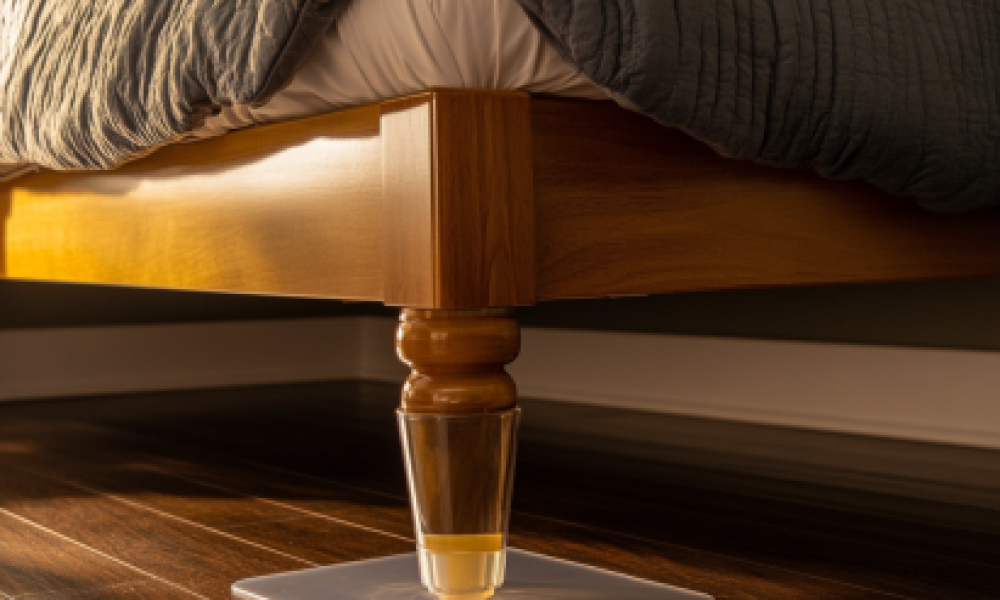Why Bed Frames Squeak and How to Fix Them
Ever been jolted awake by a squeaky bed frame during the night? You’re not alone. A noisy bed can turn your cozy bedroom into a sleep-stealing frustration. Whether it’s a soft creak when you roll over or a full-on screech every time you shift, you might be wondering: Why does my bed frame squeak? It’s one of those little annoyances that can really mess with your rest.
Key Takeaways
- Loose joints and screws are common culprits behind bed frame squeaks.
- Worn-out box springs and friction between the mattress and frame can also cause noise.
- Simple fixes like tightening hardware, adding lubrication, and using padding can silence squeaks.
- Regular maintenance can prevent future squeaks and extend the life of your bed frame.
Why Bed Frame Squeaks Matter
It’s not just about the noise (although that’s annoying enough). When you start asking yourself, why does my bed frame squeak, it might be time to take a closer look. A squeaky bed frame can signal wear and tear or loose parts that might get worse over time. It can also impact your quality of sleep. Ever found yourself lying still like a statue just to avoid the sound? That tension adds up, and it can leave you feeling less rested in the morning.
Plus, let’s be real—if you share your bed, the squeak doesn’t just affect you. Your partner hears it too, and it can lead to more tossing, turning, and maybe even a little side-eye.

Common Causes of a Squeaky Bed Frame
Here’s where things get interesting. There are actually a few different reasons your bed might be squeaking. Let’s break them down.
Loose Joints and Screws
Over time, the bolts and screws that hold your bed frame together can start to loosen. Maybe you moved recently, or maybe it’s just from years of use. When the joints aren’t tight, metal or wood parts rub together and create that dreaded squeak.
Tip: Grab a screwdriver or Allen wrench and go over every connection point. Tighten them up, and see if that helps. If you’ve got a metal frame, this guide on how to stop a metal bed frame from squeaking has some great extra pointers.

Worn Out Box Spring
If your mattress sits on a box spring, that could be the culprit. Springs wear out and start to creak, especially if they’re older or have had a lot of use.
Tip: Try placing your mattress directly on the floor for a night. If the squeaking stops, you’ve found your culprit.
Friction Between the Frame and Mattress
Sometimes it’s not the bed frame itself, but how everything fits together. A mattress that slides slightly on the frame can create noise every time it moves.
Tip: Anti-slip pads or even a rubber mat between your mattress and frame can reduce movement and sound.
Quick Fixes to Silence the Squeak
Here’s the good news: you don’t have to live with a squeaky bed forever. These fixes are simple and often surprisingly effective.
Use Wax or Lubricant
Got a wooden bed? Rubbing a candle or bar of soap over the joints where wood meets wood can reduce friction and noise. For metal frames, a little WD-40 works wonders. If your bed frame is wooden, this tutorial on how to repair wood furniture offers helpful techniques you can borrow.
Add Padding
Felt pads, old socks, or strips of fabric can be wedged into wobbly joints to dampen sound. This is great for rental furniture or beds you can’t take apart.
Replace Old Hardware
Sometimes, parts just need replacing. If screws are stripped or washers have rusted, swap them out. It’s like giving your bed a little tune-up.

Busting the “It’s Just Old” Myth
One of the most common assumptions? That squeaky beds are just old beds. And while age can be a factor, it’s not the only one. New beds can squeak too, especially if they weren’t assembled tightly or the materials don’t fit together quite right.
So don’t ignore the squeak just because your bed isn’t ancient. If you’ve ever caught yourself thinking why does my bed frame squeak, it’s time to act. A few simple tweaks can make a big difference.
Sleep Peacefully Again
You deserve a bed that lets you sleep, not one that sings every time you turn over. Fixing a squeaky bed frame is usually easier than you think, and the payoff is huge: better sleep, a calmer bedroom, and one less thing to stress about.
Want more tips on making your bedroom a dream-worthy retreat? Check out our guide on bed frame maintenance and explore more comfy solutions on our blog.
Addressing the question, why does my bed frame squeak, can lead to a more restful night’s sleep. Regular maintenance and simple fixes can make a significant difference in your sleep quality.
FAQ
- How often should I check my bed frame for loose screws?
- It’s a good idea to inspect your bed frame every 6 months to ensure all screws and bolts are tight. Regular checks can prevent squeaks before they start.
- Can humidity affect my bed frame’s squeaking?
- Yes, changes in humidity can cause wooden bed frames to expand or contract, leading to squeaks. Using a dehumidifier can help maintain consistent moisture levels.
- Is it better to replace a squeaky bed frame or fix it?
- In many cases, simple fixes like tightening screws or adding lubrication can resolve squeaks. However, if the frame is old or damaged, replacement might be the better option.
- Do all bed frames eventually squeak?
- Not necessarily. High-quality bed frames made from durable materials and properly maintained can remain squeak-free for years.
- Can a mattress topper help reduce bed frame squeaks?
- While a mattress topper can add comfort, it won’t address the root cause of squeaks. It’s essential to identify and fix the source of the noise within the bed frame.























